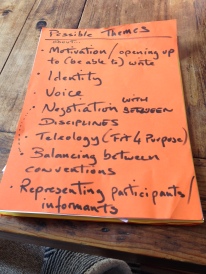This week we had our first ‘peer led’ session. Fifteen of us came together to discuss what we had taken from the previous week, how the exercises and reading had impacted the way we think about the writing process – and some cases have been able to approach our writing this week.
 We did lots of talking… A number of themes came up form our discussions and Andy kindly noted some of them down. These were as much to do with why we wanted to be in/attend the group as they were to do with how we relate to writing. We hope, I think, to revisit some of these in the coming weeks.
We did lots of talking… A number of themes came up form our discussions and Andy kindly noted some of them down. These were as much to do with why we wanted to be in/attend the group as they were to do with how we relate to writing. We hope, I think, to revisit some of these in the coming weeks.
But as well as talking and discussing we made sure that we did some writing. We set ourselves a free writing task to write based on the discussions and the reading.
I loved the reading, so much of it resonated with me – thanks Rebecca, Emily and Tamsin for introducing me to it. This is what I (Elsie) wrote:
“What of ‘me’ do I bring to the writing? To the research?… I Wonder if the question should be ‘what do I not bring’? What of me does not come through?
Actually, my playful and fun side tends to get let behind, the bit of me that does cartwheels in the park, and who dances to taylor swift as a not even guilty pleasure. The young person, the fun person, the naive person, seems to get tucked away when I write because(?) I have to have an authorial voice – be an ‘expert’? – have a well formed opinion. I haven’t expected this, a well formed opinion, from any of my participants – but I do expect it of myself…
I bring to the writing (process?) my insecurity, my gender, my own experiences of sexual violence, my youth work experience and my expectations of what it is to be and academic.. I bring my privileges and yet my ‘youth’ gets tucked away because I want to sound ‘older’, more competent than I am… In this room right now I think I am probably the youngest person – or certainly one of the 3 youngest by quite a way. But when I do my youth work and my research I am the oldest, and I feel I have to act with confidence and competence – which hides the younger person that I am. Yes I am an adult, I feel pretty ‘adulty’ in many ways. I have responsibility and independence – I feel very responsible for this group right now… But I am also inexperienced in so much, yet don’t always feel able to show this… or perform it incase my ‘youth’ gets in the way. It’s tricky that liminal space of ‘youth’….”
I think that this was partly inspired by the reading and discussion but also the teaching I’ve been doing this week about youth transitions… considering how do we become ‘adult’, so what I wrote was not actually that surprising… I don’t think…
When I shared this with Fawzia we talked a lot, about lots of things – she had written a wonderful piece that has a very different style to me – But for both of us the idea of performance came out loud and proud. We wondered ‘does writing disguise?’ does it mask who we are and some of what and how we think because we feel we have to perform in our writing. we wondered how we can develop the confidence to write tentatively and to be hesitant.


I really enjoyed our second group and was greatly inspired, humbled and encouraged by the ideas in the room. Below is my 10 minute response to the article based on the idea of writing as a method of discovery-i used the idea of a patchwork quilt. Tray x
Writing is always a method of discovery: A ten-minute response to the Richardson Article.
I write to understand at least at first. I write to make sense of what I think and where the learning is taking me. What are the connections here and how does this concept meet this idea and how on earth does this interact with my data? So my writing is like a map. A map of the ideas, the connections, the disjunctions between ideas. In that sense, it’s also a bit like a patchwork quilt-some of the thinking will be old well-worn cut up from dresses that I have grown out of. Some will be formed of newer designer thinking and then the job is to work out how can this brand new material fit alongside the old patch and how can I possibly sew it together to make one quilt. This process of finding, cutting, arranging and sticking is repeated over and over again. Sometimes, as more and more appears on the page I realise that the first square of material no longer fits any more. It’s too old and too frayed-it belongs to the journey of the quilt but not the finished product. At this point I am starting to become an audience for my creation. I look back at the original pattern but see that it is now something new- a different piece. This means sometimes throwing out some of the patches that may be dear to me-that I may have history with- and it can feel very hard to let them go. The process of unpicking and reconstruction can be painful.
LikeLiked by 2 people
Dear Tracey
You might like this article which I have attached which talks of bricolage and collage and seems to be to be working with some of your ideas!
Click to access artistic-representation-and-research-writing.pdf
Rebecca
LikeLike
I felt very moved by the pieces that Rebecca, Tamsin and Emily shared with us and it gave me a huge amount to ponder upon, both during and after the session. THANK YOU.
We’ve been speaking a lot about ‘us’ and what we bring of ourselves to our writing and this led me to thought about the elusive ‘them’ – the subjects of our research. I wrote about this during the session when we discussed what we are ‘working under’:
‘I was drawn to doing a PhD in an attempt to better grasp issues related to social injustice. I wanted to make the world a ‘better place’ yet have come to deeply question what it means to pure impact or influence. How can I decolonise my writing, so that it does not cast a net over my field site, capturing the people who shared their stories with me, as mere morsels of meat which I process and package to be devoured as though canned tuna fish, wedged within the sandwiches to be served at some or other academic meet and greet?
I wanted to act with information and yet I’m starting to feel like the post-structural(or post modern? definitely a ‘post’…) rhetoric I’ve been gulping down has made everything feel so fragmentary, so partial, that I’m left standing over shards of a broken reflection, with my research participants scattered like lost M & Ms across my consciousness. I’ve given up on attempting to show their ‘voice’ which had been the reason I fell into this PhD in the first place. And my voice? Which one will I be showing? There are about 37 of them and only 16 of which I’ve ever unleashed at Falmer station.
LikeLiked by 3 people
Apologies for the delay in ‘writing’ – have been meaning to share this since last week after our second session. In the free writing that we did, I wrote as a response to the Richardson article to the idea of ‘people who write are always writing about their lives’, along with the question ‘what of me do I bring to my writing?’
As an exercise in self-reflexivity, I keep thinking of the reasons for doing this research / PhD. What is my rationale, my personal rationale, my justification for going in to a community I do not ‘belong’ to for research? Who am I to represent (if I can dare use that word!) their struggles, sufferings, shared learnings, when I myself know nothing of it, or have lived through it? I reached out to ‘them’ for the knowledge of this unique context that I do not possess but in doing so I may end up sharing my own version of it. All this makes me wonder if the way we look at ourselves makes the world that we see around us. The way we relate to people, our ‘research participants’, is the way we relate to our own selves. It is not as simple as people telling us their stories and we as researchers re-telling it, it is really about knowing ourselves and the ‘voice(s)’ we represent. Am I then just sharing my own fears, insecurities, vulnerabilities when my participants talk to me about their fears, insecurities, vulnerabilities? Is this about ‘what people are saying to me, and/or what I think that they are saying to me’, I ask?
LikeLiked by 1 person